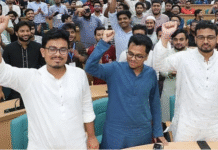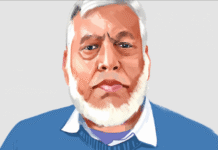Mo Chaudhury
First, the joining of Arabization and Islamization is driven by the fact that Arabs are overwhelmingly Muslims. Importantly, the reverse is not true, most Muslims are not Arabs. Thus the joint vilification of Arabization and Islamization is rather misplaced. For centuries, as the East Indians and South-East Asians converted to Islam, their indigenous way of life did not get Arabized. Also, the Arab culture reflects the wider Semitic practices indicating its inherent independence of Islam.
Second, Arabic is a man-made language and Arabs existed long before the advent of Islam. Since Prophet Mohammed (PBUH) was an Arab, the Quranic verses are cast in the Arab context for the Prophet to live by example and to enable the Arabs to connect to his message. But to be universal, it is their spirit and not their letters that should constitute their application. The literal and ritualistic modules of Islam are thus self-defeating that leave no room for tolerance of a competing module, let alone indigenous cultural norms and other religions.
Flush with financial means and aided by technology, the drive for legitimacy and supremacy by the competing literal modules of Islam has unleashed a global wave of religious ritualism, extremism and militancy. The wave reaching Bangladesh is an Arab-centric one by way of early historic links, regular pilgrimage related travel and the modern day economic links of trade, aid, banking and labor mobility. The inevitable consequence is the infiltration of religious ideologies and cultural practices by Arab Muslims, most notably in KSA. That is, the recent trend of Arabization in Bangladesh is a natural by-product of forcible Islamization as envisioned by the sponsoring Arab-centric module.
But Arabization par se is not the driver of religious militancy in Bangladesh. For centuries, Bangla vocabulary and Bangali (and sub-continental) culture have evolved and thrived on the fusion of indigenous and non-indigenous (Indian, Afghan, Persian, Turk, Anglo, Portuguese, Burmese, etc.) sources. And yet there was no major transformation in the religiosity and religious practices of Bangalis. Thus causality runs from Islamization to Arabization and not the other way.
Third, in a confused reaction to religious militancy, many Bangalis are being critical of changes in everyday practices that are perceived as akin to Arabization. Two such lightning rods are the parting phrase “Allah Hafez” and the wearing of hijab.
The fierce critique of “Allah Hafez” and defense of “Khoda Hafez” by Bangalis defies any logic. “Khoda” is a Persian word and “Allah” is an Arabic one. Unless Persianization of Bangalis is more acceptable than Arabization, there is no reason to detest “Allah” in favor of “Khoda” by Bangali Muslims since “Allah” is the word for God in the Holy Quran. The argument that “Khoda” has traditionally been used is a lame one. The ancestors of Bangali Muslims were mostly Bangali Hindus and yet “Ishwar” and “Bhagaban” gave away to “Khoda”. It is also paradoxical that the very people who wish to retain “Khoda” in “Khoda Hafez” are hysterically opposed to “Zindabad”, a cheering phrase in Hindi-Urdu tradition and of Persian origin. Thus the argument against “Allah Hafez” makes little sense, is silly and hypocritical.
With respect to Hijab, it should be noted that covering of hair and bosom in public by girls/women is a historic tradition in the Indian subcontinent, most notably amongst the Muslims and Sikhs. Dopatta, anchal of Saree and borkha (with uncovered face) have long been used for this purpose. And the decency/privacy purpose of such clothing transcends any specific religion. Granted that Hijab is an Arab tradition, opposition to it runs against the principle of freedom of expression with decency. It is also hypocritical since we do not observe the same degree of disapproval and outrage against the massive infiltration of western and non-Bangali Indian wardrobes, along with music, serial dramas and movies, and even the wedding rituals.
Fourth, for a true believer in Islam, Prophet Mohammed, PBUH, is the dearest human being that ever lived. Looking down upon Bangali Muslims who choose to practice the beloved Prophet’s language and culture is disrespectful. More importantly, it can trigger resentment that may transform benign religiosity into fatal extremism. As we are deep into westernized practices by way of history and due to worldly necessity, opposing just Arabization as evil may send the wrong signal of selling out to the west.
Lastly, many argue that religions, Islam included, are purely a spiritual matter that is in the utmost private domain of the believer’s mind, rituals are not needed for spiritual salvation and they injuriously emphasize the letters instead of the spirit of the divine codes. Often the result of ritualistic emphasis is intolerance, leading to forcible religiosity and ultimately religious militancy. Undeniably this line of advocacy has some validity, specifically in the context of Islamization, and hence guarding against infiltration of the intolerant and highly ritualistic module of Islam is warranted. That said, it is fallacious and disrespectful to strip a religion of its rituals, private or collective, as ordained in the divine code, just because they may have undesirable consequences in some uncontrolled for instances.
To conclude, understanding the causal structure of the phenomenon of Arabization-Islamization is vital to mitigating the undesirable consequences. Blanket opposition to the phenomenon is illogical, hypocritical and counterproductive. Further, it constitutes a level of intolerance and insensitivity that allegedly characterizes the phenomenon itself. Arresting the phenomenon at the Arab source would entail massive economic costs to Bangladesh in terms of foregone wage, trade and aid, and a very unpleasant level of political, social and religious disassociation from and frictions with the Arab countries. Is Bangladesh ready for the tradeoff?
Source: New Age










